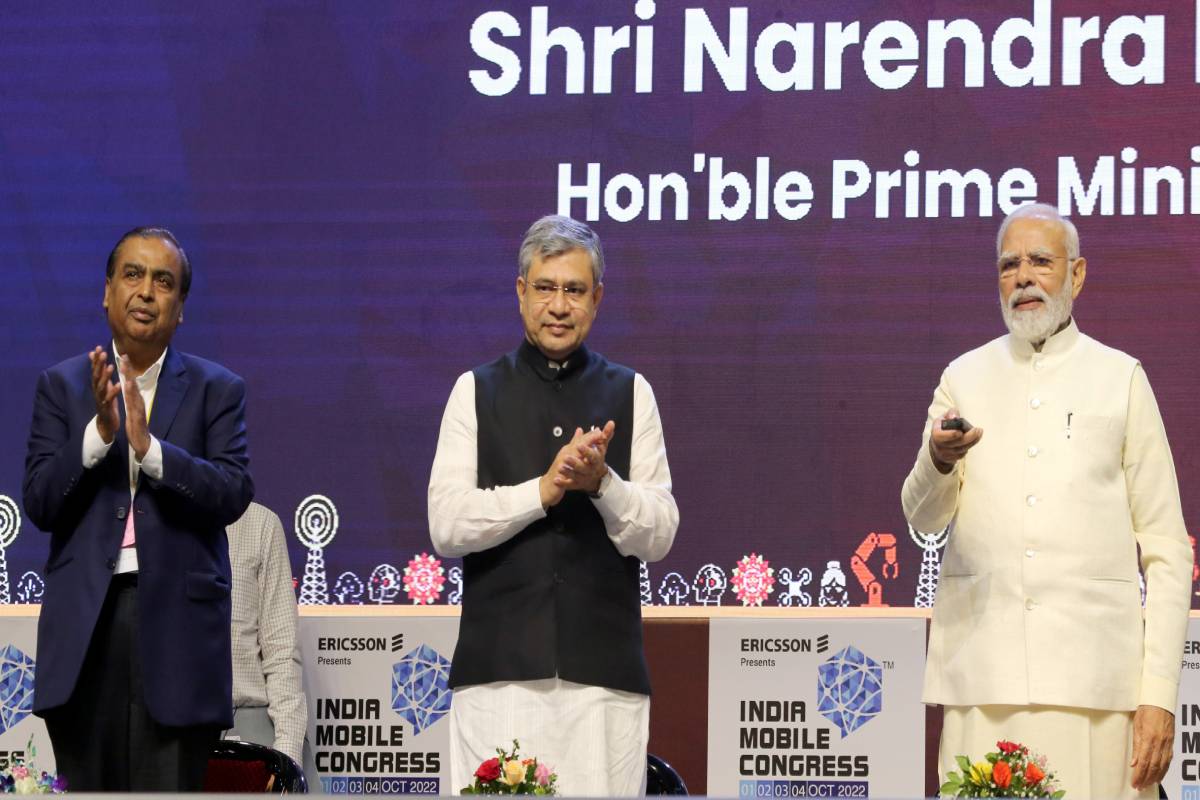Union Cabinet approves India-UAE pact on economic corridor
The aim of the IGFA is to enhance the bilateral relations and to further strengthen the relations between the two countries in the ports, maritime and logistics sectors.
Launching the service at the four-day India Mobile Congress (IMC) 2022 at Pragati Maidan in the national capital, Modi spoke about the benefits of 5G in India and how the service will help the country’s technological revolution.

PM launches 5G services, calls it 'historic day' for 21st century India (Photo for SNS: Subrata Dutta)
Ushering in a new technological era, Prime Minister Narendra Modi today launched the much-awaited 5G services, saying the New India won’t remain a mere consumer of technology but play an active role in its development and implementation.
”India will play a big role in designing the future wireless technology and the manufacturing related to it,” he said while pointing out that India was dependent on other countries for 2G, 3G, and 4G technologies. It has created history with 5G. “With 5G, India is setting a global standard in telecom technology for the first time”, he added.
The PM also inaugurated the sixth edition of the India Mobile Congress (IMC) at the Pragati Maidan in New Delhi in the presence of telecom industry leaders, including Mukesh Ambani, Sunil Bharti Mittal, and Kumar Mangalam Birla.
Advertisement
Addressing a gathering, Modi the summit today might be global but its repercussions and directions were local. He said today was a special day for the fast-developing India of the 21st century. “Today, 130 crore Indians are getting a wonderful gift in the form of 5G from the country and from the telecom industry of the country. 5G is a knock on the doors of a new era in the country. It’s the beginning of an infinite sky of opportunities. I congratulate every Indian for this,” he added. He noted with satisfaction that in this launch of 5G and the march of technology, rural areas and workers were equal partners.
Talking about Digital India, the PM said some people think that this was just a government scheme. “But Digital India is not just a name, it’s a big vision for the development of the country. The goal of this vision is to bring that technology to the common people, connecting with the people,” he said.
Focussing on the need for a holistic approach to Digital India, Modi elaborated that “we focused on 4 pillars, in four directions at once. First, the price of the device, second, digital connectivity, third, the cost of data, fourth, and most importantly, the idea of ‘digital first.
Regarding the first pillar, the PM said that the low cost of devices could only be achieved through ”Atma Nirbharta”. He recalled that there were only two mobile manufacturing units in India till eight years ago. “These numbers have now gone up to 200”, Modi said. He underlined that from exporting zero mobile phones in 2014, India has become a mobile phone exporting country worth thousands of crores. “Naturally, all these efforts have had an impact on the cost of the device. Now we have started getting more features at a lower cost”, he added.
On the second pillar of digital connectivity, the PM informed that internet users have increased to 80 crores from 6 crores in 2014. From less than 100 panchayats in 2014 now 1.7 lakh panchayats were connected by optical fiber. “Just as the government started a door-to-door campaign to provide electricity, worked on the mission of providing clean water to everyone through the Har Ghar Jal Abhiyan, and delivered gas cylinders to the poorest of the poorest people through the Ujjwala scheme, our government is working in a similar manner on the goal of Internet for all”, he said.
Regarding the third pillar, the cost of data, Modi said the industry was given a slew of incentives and technologies like 4G received policy support. This brought down the price of data and a data revolution was ushered in the country. These three pillars started showing their multiplier effect everywhere, he said.
On the topic of the fourth pillar i.e. Idea of ‘Digital First’, the PM recalled the time when a handful of the elite class questioned if the poor would even understand the meaning of digital and doubted their potential. He said he always had faith in the understanding, wisdom and inquisitive mind of the common man of the country. He said he always found the poor of the country ready to adopt new technologies.
Advertisement